US Lawmakers Urge End Of Iran Talks In Light Of Assassination Plots
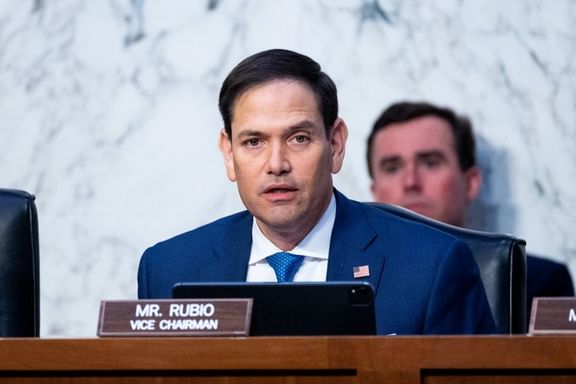
US lawmakers have criticized the Biden administration for continuing talks with Iran after revelation of Iranian assassination plots against former officials.

US lawmakers have criticized the Biden administration for continuing talks with Iran after revelation of Iranian assassination plots against former officials.
In a tweet on Wednesday, Florida’s senator Marco Rubio said, “Why is Biden still negotiating with Iran on a new 'deal' when he knows they are actively trying to assassinate former government officials on US soil?
While Iran rejected US accusations of a plot to kill former national security adviser John Bolton, the threat to US citizens can have an impact on nuclear talks as critics question Biden’s reasoning to continue the nuclear talks with the regime in Tehran.
Representative Claudia Tenney (Rep-NY) rebuked the administration for trying to “lift terror sanctions on the IRGC, even though it knew the IRGC was plotting to kill Americans on US soil.”
“The regime in Iran does not deserve nor should it receive a penny in sanctions relief,” she added.
Urging the administration to call off the talks in Vienna until the assassination plots end, former State Department Spokesperson Morgan Ortagus said, “Even in light of this, Biden admin “only respond once Iran kills one of our former officials.
“Iranian agents were willing to pay $300,000 to assassinate Bolton and suggested he be run over with a car or shot at short range. Iran planned worse for Pompeo. Iran offered to pay $1 million to kill him, and told their operative a 'long-range capability' was necessary.”
She stressed the need “to kick out the Iranian Interests Section in DC immediately and reimpose strict travel restrictions on Iranian 'diplomats’ in NYC.”

The editor of the flagship hardliner newspaper Kayhan in Tehran wrote on Wednesday that the Vienna nuclear talks have had no result that would benefit Iran.
Hossein Shariatmadari, who often speaks for Supreme Leader Ali Khamenei, claimed in the commentary that the United States and its allies, as well as Iran’s “pro-Western reformists” tried hard to force the Islamic Republic into an agreement but the Tehran’s negotiators "powerfully resisted" the pressures.
He added: "Unlike what the officials and the media claim in the West, and Iranian reformists echo, no results that would serve Iran's economic interests were obtained in the negotiations."
Iran’s reform camp that has lost political power constantly reminds the hardliners that removing sanctions is important for alleviating the serious economic crisis Iran faces. Many academics and experts also urge the government to reach a deal with the West to lift the crippling sanctions.
Shariatmadari further said that Western media and officials refuse to say that the United States has not responded to Iran's "lawful and logical demands," instead, they keep saying that a draft acceptable by both parties has been prepared and it is now Iran's turn to take the final step and finalize the nuclear agreement.
After 16 months of multilateral talks, the European Union this week presented what it called a “final draft” to all sides to restore the 2015 nuclear deal, the JCPOA. The US has said it is ready to accept it but Iran apparently wants more haggling.
Shariatmadari charged that while the US refuses to guarantee that it would remain faithful to its obligations under the JCPOA, it wishes to portray Iran as the party that prevents the lifting of the sanctions. Meanwhile, he praised the Iranian negotiators for their resistance against those who wanted to blackmail them, and blamed former President Hassan Rouhani for the 2018 US withdrawal from the JCPOA.
Shariatmadari claimed that the Vienna negotiations have remained futile in the four areas of safeguards, lifting of sanctions, guaranteeing that the United States will not leave the agreement, and the step-by-step implementation of the agreement. Meanwhile, he criticized Iran's reformists for insisting that Iranian negotiators should have agreed to the United States' terms.
He said Iran's chief negotiator Ali Bagheri-Kani has told the Americans that an agreement without a guarantee will not be acceptable to Iran as some former US officials have said that the next government of the United States will certainly do away with this agreement.
In a related development, a petrochemicals executive, Hamid Hosseini has warned that failure to reach an agreement might lead to public dissatisfaction and a new wave of migration from Iran. Hosseini, who is also the deputy chief of the Iran-Iraq Chamber of Commerce, said, the talks have to be fruitful as this is the only way for Iran to improve its economy. He further warned that if the talks in Vienna remain futile, the UN sanctions against Iran may return to exert further pressure on Tehran to come to terms with the international community.
Meanwhile, an ultraconservative political activist, former lawmaker Hossein Naqavi Hosseini told reporters in Tehran as long as all of the sanctions are not lifted, reaching an agreement will not solve Iran's problems. "America will always use the remaining sanctions to prevent Iran from benefitting from any possible agreement," he said. Naqavi further added that "it is highly unlikely that Iran would accept Europe's proposal as there is no benefit in it."
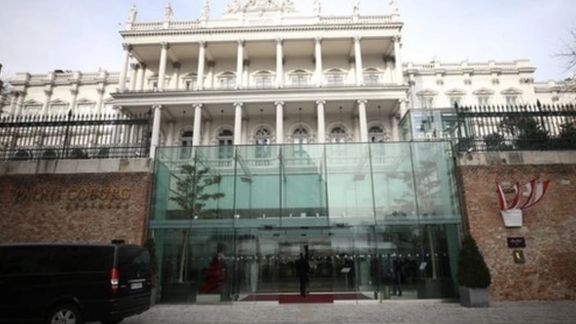
Iran's Supreme National Security Council says no high-level meeting has yet been held regarding the EU-proposed "final text" to revive the 2015 nuclear deal.
In a report on Wednesday, Nour News, a website affiliated with the secretary of Iran's Supreme National Security Council (SNSC), Ali Shamkhani, said since Tehran’s lead negotiator Ali Bagheri-Kani and his team returned from Vienna "the process of examining the ideas proposed by the European Union coordinator has started at the expert level and is still continuing."
No high-level meeting has yet been held to review the EU’s ideas in Tehran, and according to the usual procedure, after the completion of the expert review process, the preliminary results will be presented to the relevant decision-making bodies for a final decision, the report said.
On Monday, August 8, Iran’s Foreign Minister Hossein Amir-Abdollahian and the European Union foreign policy chief Josep Borrell discussed the latest round of Vienna nuclear talks, reiterating that all parties involved in the talks must take serious steps toward reaching the final text of an agreement.
Iran insists that the text offered for renewing the 2015 nuclear deal is not a final agreement but European officials described the document to journalists as a ‘take it or leave it’ offer for both sides.
Tehran demanded more drastic concessions outside the scope of the original agreement, including the closure an International Atomic Energy Agency probe into undeclared nuclear material found in three undisclosed sites.
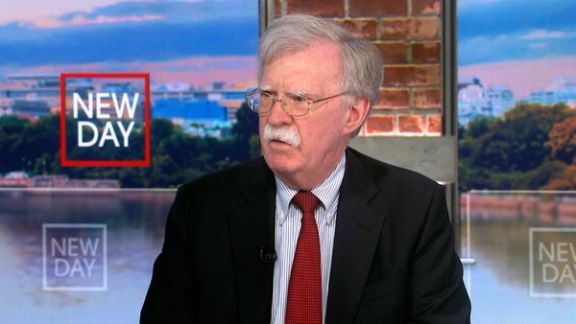
While Iran rejected US accusations of a plot to kill former National Security Adviser John Bolton, the threat to US citizens can have an impact on nuclear talks.
Bolton told Iran International that there are several American public figures who face direct threats. Axios reported Wednesday that US law enforcement have also told former Secretary of State Mike Pompeo that he is a possible target of an Iran plot.
In its denial issued immediately after an indictment was unsealed by the Department of Justice against a member of Iran’s Revolutionary Guard, Tehran accused Washington of “weaving a tale” to exert pressure in the nuclear talks.
But as the news of a serious and real threat against former and possibly current US officials sinks in, critics of reviving the 2015 nuclear deal (JCPOA) with Iran are bound to ask the Biden administration not to continue negotiations with Tehran.
Bolton himself warned in a statement on Wednesday, “Iran’s nuclear-weapons and terrorist activities are two sides of the same coin. No responsible US government should think otherwise. America re-entering the failed 2015 Iran nuclear deal would be an unparalleled self-inflicted wound…I remain committed to making sure it does not happen.”
At the same time, current national security adviser Jake Sullivan issued a statement from the White House saying, “Should Iran attack any of our citizens, to include those who continue to serve the United States or those who formerly served, Iran will face severe consequences. We will continue to bring to bear the full resources of the U.S. Government to protect Americans.”
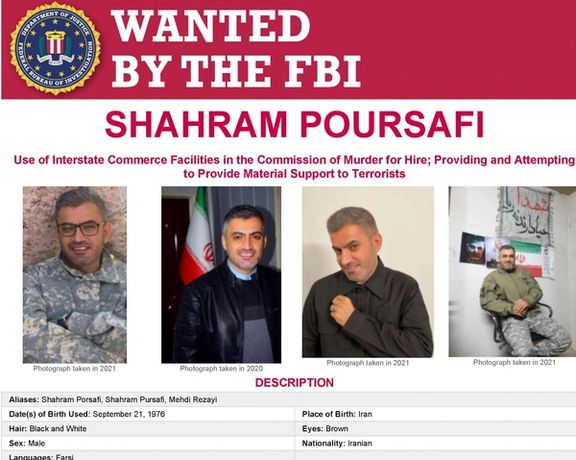
But the DOJ clearly says Iran tried to kill Bolton and many would say this is enough reason for “severe consequences”. However, Reuters quoted an unnamed US official as saying that Washington does not believe the assassination plots should affect talks the JCPOA talks with Tehran.
Republican Senator Marco Rubio tweeted, "Why is Biden still negotiating with Iran on a new “deal” when he knows they are actively trying to assassinate former government officials on U.S. soil?"
Norman Roule, a long-time senior Central Intelligence Agency official and an expert on the Middle East tweeted that the plot against Bolton “was almost certainly approved by the senior-most leadership of Iran & undertaken only after a determination that its exposure would not invite a significant response.” He added that “Iran will likely continue these operations absent swift and meaningful international actions. The failure to demonstrate deterrence risks Iran undertaking an operation that, if successful, could ignite a regional conflict.”
Kylie Moore-Gilbert an Australian-British academic who was a hostage in Iran tweeted, “Not sure how the US can claim its negotiating with Iran in good faith over a seemingly-mythical JCPOA at quite literally the same time that Iran is funding multiple terror plots that aim to assassinate US citizens on US soil.”
After 16 months of negotiations to revive the JCPOA, Iran is still considering a draft submitted by the European Union that coordinates the talks. US has said it is ready to lift the crucial economic sanctions if Iran agrees to return to the limitations set by the 2015 agreement, but Tehran wants more sanctions to be lifted.
One group of sanctions are those imposed on the IRGC and its affiliated entities for involvement in terrorism, which now seem impossible for the administration to agree to, given the DoJ indictments of an IRGC member.
A former State Department official, Gabriel Noronha, who opposes the JCPOA tweeted, “So again today, we saw Jake Sullivan with another stern warning to Iran, that only threatens consequences ONCE Iran attacks a US citizen. There would be no measures taken beforehand, just afterwards when Bolton/Pompeo are dead. This is Russia/Ukraine all over again.”
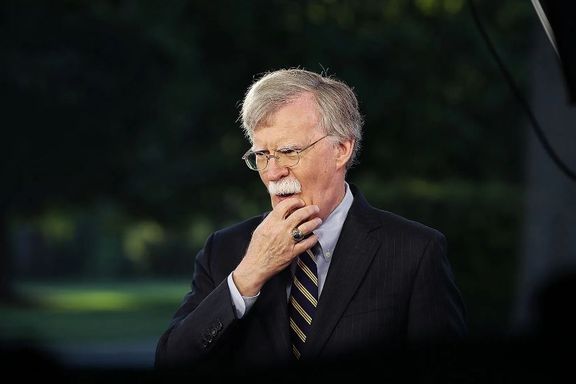
The US is not doing enough to stop the Iranian threat against former officials, John Bolton who was the target of an assassination plot told Iran International.
The Justice Department revealed on Wednesday that an operative of Iran’s Revolutionary Guard tried to hire a hitman in the US to kill former National Security Adviser John Bolton.
A statement by DoJ saidShahram Poursafi, also known as Mehdi Rezayi, 45, had attempted to pay “individuals in the United States” $300,000 to carry out the killing, “likely in retaliation for the January 2020 death of Iran’s Islamic Revolutionary Guard Corps – Qods Force (IRGC-QF) commander Qasem Soleimani.”
Bolton told Iran International Television anchor Fardad Farahzad that he was not surprised as an indictment was unsealed because he was kept informed “in general terms until late in 2021 when it was determined I would again get secret service protection.”
As the news about the assassination plot against Bolton was announced, Axios reported that DOJ also told former Secretary of State Mike Pompeo that he too was one of the former Trump officials targeted by the government of Iran.
After the US targeted killing of Iran’s Qasem Soleimani in January 2020 in Baghdad, Iran’s top leaders have repeatedly threatened revenge against Trump administration officials, including President Donald Trump himself.
Bolton said that he is aware of many ex-officials being the target of possible Iranian plots. “So, it's a very real threat, and obviously we're not doing enough to stop it because it continues,” he said, adding, “I really can't discuss names, but this is something that characterizes the regime in Tehran, and obviously the US has not done enough to deter the regime.”
Critics of the Biden administration say that with this kind behavior by Iran, the United States should stop making deals with Tehran and promising to lift sanctions that would give the Iranian government tens of billions of dollars in cash and economic benefits.
However, Reuters quoted an unnamed US official as saying that Washington does not believe the assassination plots should affect talks with Tehran on reviving the 2015 nuclear deal, known as the JCPOA.
Asked if he thinks the issue of Iranian threats to US citizens should be raised in the JCPOA talks, Bolton said, “I think that was really part of the fundamental flaw of the 2015 nuclear deal, the idea that the Ayatollah Khamenei had two brains: one brain was the nuclear brain, the other brain was the terrorist brain. He doesn't. It's all part and parcel of the same thing. So fundamentally the nuclear deal was not going to deal with the terrorist issue.”
Bolton went on to say that “In fact, what we see now is that this regime has no intention whatever to comply with any commitments that it makes. It's untrustworthy, it's clearly an enemy of the US. That's what these threats of assassination show.”
Asked if from the benefit of hindsight, he would still support Soleimani’s killing, the former national security adviser said, “Soleimani was a terrorist,” and argued that the Islamic Republic has been threatening and killing Americans since its establishment in 1979, not just after Soleimani’s killing.
“So yes, their threat has been growing, but it's been growing for a long period of time. This is a dangerous, untrustworthy regime.”
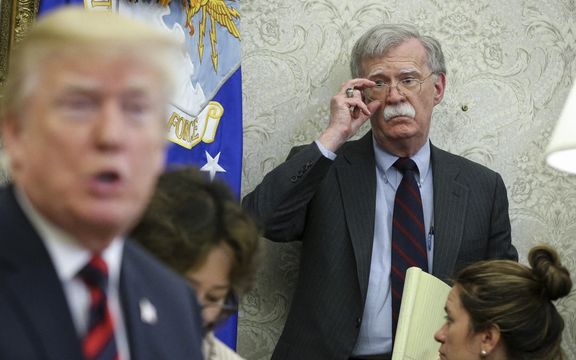
A member of Iranian Revolutionary Guard was charged Wednesday with planning to assassinate John Bolton, the former United States National Security Advisor.
A statement from the US Justice Department alleged Shahram Poursafi, also known as Mehdi Rezayi, 45, had attempted to pay “individuals in the United States” $300,000 to carry out the killing, “likely in retaliation for the January 2020 death of Iran’s Islamic Revolutionary Guard Corps – Qods Force (IRGC-QF) commander Qasem Soleimani.”
Bolton was National Security Advisor April 2018-September 2019 and was not in the post when President Donald Trump authorized the drone strike in Baghdad in which Soleimani and nine others died. The United Nations special rapporteur judged Soleimani’s death “unlawful killing.”
The Justice Department statement cited court documents suggesting Poursafi launched a plan to kill Bolton, either in Washington, the District of Columbia, or Maryland in October 2021 by asking an unnamed individual – whom he met online – to take photographs of Bolton, ostensibly for a book Poursafi was writing. The individual concerned introduced Poursafi to a second person whom he offered $250,000, later increased to $300,00, to eliminate the ex-presidential advisor.

This second person, identified by the Justice Department statement as a “source” for the criminal investigation, was told by Poursafi there was an additional “job” for which he would be paid $1 million. During communications, the statement said, the source referred several times to Poursafi being “associated with IRGC-QF,” which it said Poursafi never denied.
According to the statement, Poursafi then provided the source with Bolton’s work address. The statement did not explain why the alleged plot, which was investigated by the Federal Bureau of Investigation (FBI) Washington Field Office, was never carried out, nor whether Poursafi had conducted the whole scheme virtually without even entering the US.
Poursafi ‘at large abroad’
“If convicted, Poursafi faces up to 10 years imprisonment and a fine up to $250,000 for the use of interstate commerce facilities in the commission of murder for hire, and up to 15 years imprisonment and a fine up to $250,000 for providing and attempting to provide material support to a transnational murder plot,” the Justice Department statement noted. It added that Pousafi “remains at large abroad.”
The Washington Examiner in March alleged that the Biden administration had blocked the Justice Department from taking action over an Iranian plot to kill Bolton in order not to derail Vienna talks aimed at reviving the 2015 Iran nuclear deal, the JCPOA (Joint Comprehensive Plan of Action). The State Department January informed Congress there was a “specific threat” from Iran against Brian Hook, Trump’s special Iran envoy at the time Soleimani was killed.
Earlier this month, women’s rights activist Masih Alinejad was told by the FBI that a man arrested near her Brooklyn home with an assault rifle had been sent by Iran to kill her. Alinejad, who became a successful author and doyen of US-funded media since leaving Iran 2009, was the target last year of a kidnap plot that remains a live criminal case with defendant Niloufar Bahadorifar still to face court after her arrest in July 2021.